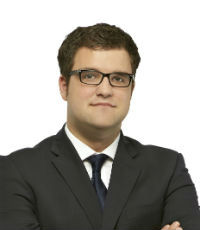Kyle Johnson of Alexandra Horwood and Partners is part of the Wealth Professional Canada Young Guns 2017.

Associate investment advisor
ALEXANDRA HORWOOD AND PARTNERS (RICHARDSON GMP)
Age: 31
Years in the industry: 5
Finding your feet at Canada’s largest independent wealth manager doesn’t come easy. Part of Alexandra Horwood and Partners at Richardson GMP, Kyle Johnson had to pay some dues at the firm to reach his current position.
“When I started, I was an unlicensed assistant, so I was the one getting the coffee, setting up meetings and completing the miscellaneous administrative duties required to run a successful practice,” he says. “I think it was necessary to have this solid foundation of understanding how the business works in order for me to move on to ‘bigger picture’ responsibilities.”
The bigger picture, in this case, is the actual nuts and bolts of being a financial advisor with a successful practice boasting $173 million AUM. Now a licensed associate investment advisor, Johnson’s main responsibility is to build, deploy and monitor the team’s model portfolios, as well as manage all operational trading activity.
Currently in his fifth year in the advisory business, Johnson is a shining example of the young talent wealth management needs a lot more of, but has struggled to attract. He feels there’s a simple explanation for – and perhaps an equally simple solution to – the industry’s talent shortfall.
“I believe the wealth management business has been given a bad rap by being associated with Wolf of Wall Street types of brokers and corporate greed,” he says. “If new talent were aware there are benevolent brokerage teams out there seeking the common good with stakeholders, they would discard these false preconceived beliefs.”
More advisors will mean more competition in what is already a very competitive marketplace. Because clients are a lot more knowledgeable about investments and financial planning these days, advisors need to go the extra mile to prove their worth. “Clients are becoming a lot more cost-conscious,” Johnson acknowledges, “so advisors will need to add value wherever possible instead of focusing purely on investment management.”
ALEXANDRA HORWOOD AND PARTNERS (RICHARDSON GMP)
Age: 31
Years in the industry: 5
Finding your feet at Canada’s largest independent wealth manager doesn’t come easy. Part of Alexandra Horwood and Partners at Richardson GMP, Kyle Johnson had to pay some dues at the firm to reach his current position.
“When I started, I was an unlicensed assistant, so I was the one getting the coffee, setting up meetings and completing the miscellaneous administrative duties required to run a successful practice,” he says. “I think it was necessary to have this solid foundation of understanding how the business works in order for me to move on to ‘bigger picture’ responsibilities.”
The bigger picture, in this case, is the actual nuts and bolts of being a financial advisor with a successful practice boasting $173 million AUM. Now a licensed associate investment advisor, Johnson’s main responsibility is to build, deploy and monitor the team’s model portfolios, as well as manage all operational trading activity.
Currently in his fifth year in the advisory business, Johnson is a shining example of the young talent wealth management needs a lot more of, but has struggled to attract. He feels there’s a simple explanation for – and perhaps an equally simple solution to – the industry’s talent shortfall.
“I believe the wealth management business has been given a bad rap by being associated with Wolf of Wall Street types of brokers and corporate greed,” he says. “If new talent were aware there are benevolent brokerage teams out there seeking the common good with stakeholders, they would discard these false preconceived beliefs.”
More advisors will mean more competition in what is already a very competitive marketplace. Because clients are a lot more knowledgeable about investments and financial planning these days, advisors need to go the extra mile to prove their worth. “Clients are becoming a lot more cost-conscious,” Johnson acknowledges, “so advisors will need to add value wherever possible instead of focusing purely on investment management.”



